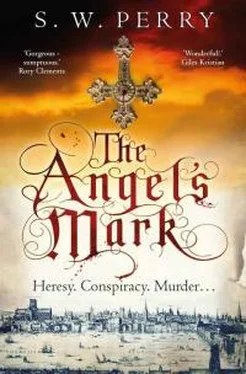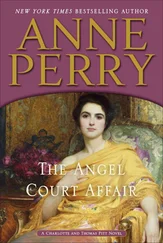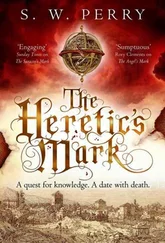It costs Nicholas twice the price of a wherry fare to get the names. And when he locates them, the men turn out to have been somewhere else on the day.
I thought I’d been in London long enough not to get gulled so easily, he thinks as he walks back across the bridge. He feels dispirited. Oddly ill-at-ease. He longs to share his fears with the one person he knows would listen sympathetically. But that’s impossible. How can he dare even whisper of child-murder when Eleanor is so close to her time?

Three days after his visit to Coroner Danby’s clerk at Whitehall, Nicholas attends a formal lunch at the College of Physicians. Harriet has strict instructions not to linger if the baby comes – she is to hurry by the fastest route to the Guildhall, and no stopping to gossip on the way.
Today’s guest of honour is John Lumley, Baron Lumley of the county of Durham and of various estates in Sussex and Surrey. It is Lord Lumley who, by the queen’s gracious licence, had endowed the College of Physicians with an annuity of forty pounds a year – from his own purse, of course, not hers. It pays for a reader in anatomy. Sir Fulke Vaesy is the present incumbent.
The agenda is wearyingly familiar to Nicholas: first the prayers, then the food – roasted pigeon, salmon and plum porridge. Then an address by the College’s distinguished president, William Baronsdale. The heat of the day and the heaviness of his formal gown lead Nicholas to wonder if he can fall asleep without anyone noticing.
Baronsdale rises with ponderous solemnity, his ruff starched to the unyielding hardness of ivory. He’s barely able to move his head. He looks to Nicholas like a ferret stuck, up to the chin, in a drainpipe.
‘My noble lord, sirs, gentlemen,’ he begins sonorously, ‘it is my duty to acquaint you with the gravest threat to face this College in all its long and august history.’
His drowsiness instantly banished, Nicholas wonders what impending calamity Baronsdale means. Has there been an outbreak of pestilence he hasn’t heard about? Has Spain sent another Armada? Surely Baronsdale isn’t going to mention the chaos everyone fears will come with the queen’s death, given that she cannot now be expected to provide the realm with an heir. Discussion of the subject is forbidden by law. Not even old Dr Lopez, Elizabeth’s physician, who at this very moment is wiping his plate with his bread, dares mention it.
This lunch might yet prove more entertaining than I’d expected, thinks Nicholas.
In fact, it transpires that Baronsdale is warning them of a far greater hazard than any of those Nicholas has contemplated. It is this: how to stop the barber-surgeons passing themselves off as professional practitioners, thus impertinently considering themselves the equal of learned physicians.
An hour later, with Nicholas’s eyelids again feeling like lead, the great men of medicine agree on their defence. The nub of it, according to Baronsdale, is that the barber-surgeon uses tools in the practice of his work. He must therefore be a tradesman. In other words, little better than a blacksmith. ‘Why, if everyone who wields a sharp point in their daily toil considers themselves a professional,’ proclaims Baronsdale, ‘there’d be a guildhall, a chapel and a chain of office for the seamstresses!’
Nicholas has an urgent need to talk to the wall at Grass Street again. But there’s no escape for him. Not yet. Baronsdale hasn’t finished. It appears the barber-surgeons are not the only threat facing the College.
‘On Candlewick Street, a fishmonger named Crepin is alleged to be selling unauthorized cures for lameness, at two pennies a pot,’ he whines. ‘On Pentecost Lane, one Elvery – whose trade is that of nail-maker – is said to be concocting a syrup to cure the flux. He prescribes it without charge. Doesn’t expect so much as a farthing.’
Mutters of disapproval from around the table.
‘There is even a woman –’
More than a few gasps of horror.
‘Yes, a common Bankside tavern-mistress. Goes by the name of Merton. They say she concocts diverse unlicensed remedies, without any learning whatsoever!’ Baronsdale wags a finger to signify the Christian world is teetering of the edge of the pit of hell. His neck twists rigidly in his ruff as though he’s trying to unscrew his head. ‘We must put an end to these charlatans,’ he says gravely, ‘lest the learning of fifteen centuries be hawked outside St Paul’s Cross for a loaf of bread or a pot of ale!’
The applause is warm and appreciative. But Nicholas notices the guest of honour, John Lumley, seems unperturbed by these dire warnings of impending catastrophe. In fact, is that a yawn the rather sorrowful-looking patron of the chair of anatomy is trying to stifle?
Though Nicholas has only observed John Lumley from his own lowly orbit, Lumley’s reputation is well known to him. He is the queen’s friend, though he’s served time in the Tower for once desiring a Catholic monarchy. He’s a man of the old faith, yet in possession of a mind always on the search for new knowledge. His great library at Nonsuch Palace is said to be the match for any university library in Europe. And though he funds the chair of anatomy from his own purse, he’s not a physician. Which, thinks Nicholas, might just make him the perfect man to turn to.
But how, exactly, does a junior member of the College raise the subject of infanticide with one of its most senior – especially after his betters have gorged themselves on roasted pigeon and salmon, fine Rhenish wine and flagons of self-congratulation?
With confidence. That’s the answer, Nicholas decides as he waits in the Guildhall yard while around him the servants of the more successful physicians prepare for their masters to depart. Get to the point right away. Don’t hang back. Tell him what you saw.
He spots Lord Lumley’s secretary, Gabriel Quigley, standing aloof to one side. Quigley is a bookish fellow in his mid-thirties. The severe folds of his gown serve only to accentuate his angular frame. His thinning hair falls loosely over a brow marked by traces of the small-pox. He looks more like a fallen priest than a lord’s secretary.
‘Would you do me a service, Master Quigley?’ Nicholas asks. ‘I’d be grateful for a brief audience with Lord Lumley.’
Quigley’s reply tells Nicholas in no uncertain terms that a lord’s secretary is considerably nearer to God than a mere physician, any day of the week. ‘His lordship is a busy man. What would be the subject of this audience, were he to grant it?’
‘A matter of great interest to an eminent man of physic,’ says Nicholas, biting his tongue. It’s better than ‘The violent overthrow of this place and all who dwell in it’, which is what he’s been considering since before the plum porridge was served.
‘My lord, I wondered if I might speak to you about Sir Fulke Vaesy’s recent lecture,’ Nicholas begins, with a respectful bend of the knee, when Quigley brokers the meeting.
‘The drowned boy-child?’ Lumley recalls. ‘Coroner Danby took not a little convincing over him.’
‘A most unusual subject, my lord.’
‘Indeed, Dr Shelby. One likes to feel that when Sir Fulke dissects a hanged criminal, the fellow is making some sort of reparation for his offences by adding to our understanding of nature. But a poor drowned child is quite another matter. Still, I always say we men of learning should not let our natural sensitivities get in the way of discovery.’
Natural sensitivities. Nicholas prays Lumley isn’t going to turn out to be as lacking in them as his protégé. ‘My lord, on the subject of the infant – I couldn’t help but notice–’
Читать дальше













